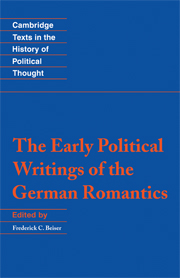Book contents
- Frontmatter
- Contents
- Preface
- Introduction
- Chronology of early Romanticism
- Bibliographical note
- Translations
- Editions cited and abbreviations
- The Oldest Systematic Programme of German Idealism
- Pollen
- Faith and Love
- Political Aphorisms
- Christianity or Europe: A Fragment
- Fragments from the notebooks
- Essay on the Concept of Republicanism occasioned by the Kantian tract ‘Perpetual Peace’
- Athenœum Fragments (excerpts)
- Ideas
- Philosophical Lectures: Transcendental Philosophy (excerpts), Jena, 1800–1801
- Philosophical Fragments from the Philosophical Apprenticeship (excerpts)
- Monologues II and III
- Index of names
- Index of subjects
- Cambridge Texts in the History of Political Thought
Fragments from the notebooks
Published online by Cambridge University Press: 05 June 2012
- Frontmatter
- Contents
- Preface
- Introduction
- Chronology of early Romanticism
- Bibliographical note
- Translations
- Editions cited and abbreviations
- The Oldest Systematic Programme of German Idealism
- Pollen
- Faith and Love
- Political Aphorisms
- Christianity or Europe: A Fragment
- Fragments from the notebooks
- Essay on the Concept of Republicanism occasioned by the Kantian tract ‘Perpetual Peace’
- Athenœum Fragments (excerpts)
- Ideas
- Philosophical Lectures: Transcendental Philosophy (excerpts), Jena, 1800–1801
- Philosophical Fragments from the Philosophical Apprenticeship (excerpts)
- Monologues II and III
- Index of names
- Index of subjects
- Cambridge Texts in the History of Political Thought
Summary
Philosophical Studies (1795–6)
421 The state is a person, just like the individual. What the individual is to himself the state is to individuals. States will differ among themselves as long as people do too. In essence the state is always the same, just as man always is.
497 Action according to principles is not valuable on account of the principles but on account of the constitution of the soul that it presupposes. Whoever can act according to principles must be a worthy person. But his principles do not make him a worthy person. What does so is only what his principles are according to him: concepts of his manner of acting, forms of thought of his being.
617 No universal system of political economy is possible.
620 Only improvements in morals and character are real improvements. Everything else is only fashion, change, insignificant improvements.
623 Dreams of the future – is a kingdom of a thousand years possible? – Will all vices ever disappear? Only when the education to reason is perfected.
625 Do the people owe the aristocracy nothing? Are they mature enough to dispense with them?
652 Property in our legal sense is only a positive concept, i.e. it will end with the state of barbarism. Positive right must have a positive foundation a priori. Property is that which gives one the possibility of expressing freedom in the sensible world.
- Type
- Chapter
- Information
- The Early Political Writings of the German Romantics , pp. 81 - 92Publisher: Cambridge University PressPrint publication year: 1996
- 1
- Cited by



